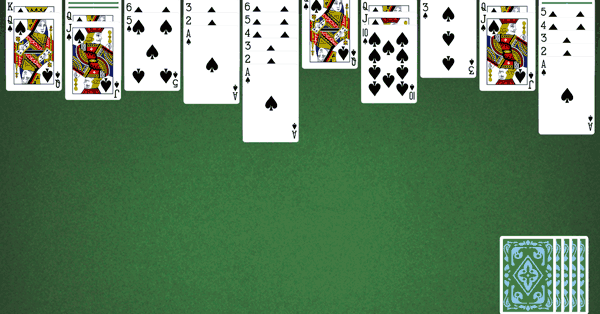Spider Solitaire is a popular single-player card game that has captured the attention of millions of players around the world. Here are some interesting facts about Spider Solitaire you should know:
-
Origin
Solitaire Spider game was created by Paul Alfille in 1989 as a computer game. It was included in the Microsoft Windows operating system, starting with Windows 98.
-
Name Inspiration
The game is named after the eight legs of a spider, which relate to the eight foundation piles that need to be built to win the game.
-
Objective
Spider Solitaire aims to build eight sequences of cards in descending order from King to Ace within the tableau. Once all sequences are built, they are automatically removed from the tableau.
-
Difficulty levels
Spider Solitaire offers different difficulty levels, typically ranging from one suit (easiest) to four suits (most challenging). The number of suits determines the number of cards in play and the level of complexity.
-
Solvable games
Unlike other solitaire variants, Spider Solitaire games with four suits are not guaranteed to be solvable. Some combinations of initial card placements can lead to unsolvable games, adding an extra layer of challenge and strategy to the gameplay.
-
Strategy
Spider Solitaire requires strategic planning and decision-making. Players need to carefully consider their moves, anticipate future card placements, and manage their available options to maximize their chances of winning.
-
Time consumption
Solitaire Spider game can be time-consuming, especially for complex configurations. Some games can take several minutes or even hours to complete, depending on the player’s skill level and the chosen difficulty.
-
Popularity
Spider Solitaire has gained immense popularity over the years, becoming one of the most-played computer card games. Its addictive nature and challenging gameplay have made it a favorite among casual gamers.
-
Variations
While the basic rules remain the same, different versions of Spider Solitaire have emerged, offering additional features or rule variations. These variations cater to different player preferences and add new dimensions to the game.
-
Mental stimulation
Spider Solitaire is an entertaining game and provides mental stimulation. It helps improve concentration, logical thinking, and problem-solving skills as players navigate intricate card arrangements.
-
Mobile adaptation
Spider Solitaire has successfully transitioned from desktop computers to mobile devices. Numerous apps and online platforms now offer the game, allowing players to enjoy it on the go.
-
Record attempts
Some Spider Solitaire enthusiasts have set impressive records for completing the game in the shortest time possible. These speedrun records demonstrate the skill and agility of experienced players.
-
Community
Solitaire Spider game has fostered a vibrant online community of players who share strategies, tips, and challenges. Discussion forums, social media groups, and dedicated websites allow enthusiasts to connect and engage with fellow players.
-
Stress relief
Many players find Spider Solitaire a relaxing and stress-relieving activity. The game’s repetitive nature, coupled with the satisfaction of organizing cards and completing sequences, can help reduce anxiety and promote mindfulness.
-
Endurance and patience
Spider Solitaire teaches players valuable lessons in endurance and patience. Overcoming challenges and setbacks in the game requires perseverance and maintaining focus even when faced with complex situations.







